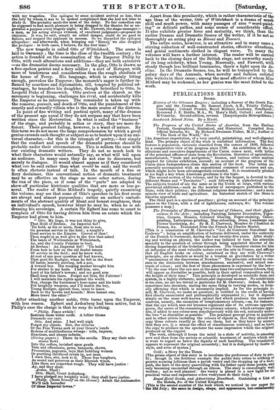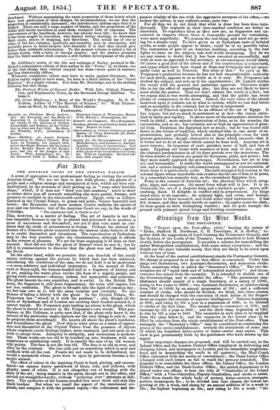PUBLICATIONS RECEIVED.
BOOKS.
History of the Ottoman Empire ; including a Survey of the Greek Em- pire and the Crusades. By Samuel Jacob, A.B., Trinity College, Cambridge; Colonel Procter, Royal Military Academy, Sandhurst; ; Reverend J. E. Riddle M.A., St. Mary's Hill, Oxford ; and James M•Conechy. Second edition, revised. (Encyclopiedia Metropolitana.) Sandwich Island Notes. By a Mole.
The Progress of the United States of America, from the Earliest Periods, Geographical, Statistical, and Historical. Compiled from Official Returns, &c. By Richard Swainson Fisher, M.D., Author of "The Book of the World," &c.
[An American importation' of a very careful, painstaking, and well-digested kind. The primary object of the work is statistical information. The first feature is population, variously classified from the census of 1850, followed by a comparative view of its progress since 1790. An exhibition of the in- stitutions and executive departments of the Union comes next, with tables of the principal officers of state from the Revolution. Statistics of agriculture, manufactures, "trade and navigation," finance, and various other matters adapted for tabular exhibition, succeed ; an account of the progress of the Union since Independence closes this section of the book. The tables are generally. accompanied with an expositional comment of acumen and use, which might have been advantageously extended. It is occasionally pitched in too high a key when American greatness is the topic.
The second seotion of the volume, and by far the largest, is devoted to the different States and " Territories " ; each following in alphabetical order. The subjects treated of are the same as in the Union at large, with various provincial additions,—such as the number of newspapers published in the State, with their politics ; the different religious denominations; • and a more minute view of trade and agriculture. An historical sketch of the State is likewise appended.
The third part is a species of gazetteer ; giving an account of the principal places in the Union, with a list of lighthouses, railways, &c. The volume possesses a map.] The Principles of Harmony and Contrast of Colours, and their Appli- cations to the Arts ; including Painting, Interior Decoration, Tapes- tries Carpets, Mosaics, Coloured Glazing, Paper-staining, Calico- printing, Letterpress-printing, Map-colouring, Dress, Landscape and Flower Gardening, &G. By M. E. Chevreul, Membre de rInatitut de France, &e. Translated from the French by Charles Martel.
[This is a translation of M. Chevreurs "Loi du Contraste Simultan5 des Couleurs " ; being an amplification of lectures delivered, under the authority of the French Government, during the last twenty-five years. After study- ing and writing on physics, the author was induced to turn his attention qecially to the question of colour through being appointed director of the dyeing department of the Gobelins tapestries. The translator claims for him an influence of the most valuable nature over the arts in France, and affirms that all English books on colour, unimbued as they are with Chevreurs principle, are as obsolete as would be a treatise on gravitation by a writer unconscious of the discoveries of Newton." The principle referred to eon- slats in the distinction between simultaneous, successive, and mixed con- trasts of colour and the first of these phenomena is expressed by the law— "In the case where the eye sees at the same time two contiguous colours, they will appear as dissimilar as possible i, both in the optical composition and in the height of their tone." This principle is developed in scientific form and system, in a highly elaborate, minute,and ingenious manner. No subdivision is too nice, no art too trivial or particular for M. Chevreul; indeed, he falls sometimes into iteration, stating the same thing in varying modes, or form- ally affirming that which is necessarily implied. As for the prinpiple it- self, M. Chevreul, we make no question, is entitled to the credit of having first clearly enunciated and philosophically expounded it ; but it depends simply on the same well-known optical fact which produces the successive contrast, namely, the causation of complementary colours,—as, for instance, that the eye which sees red becomes cognizant also of its extreme opposite, green, the union of the remaining two primary colours which extreme oppo- site, if added to any colour seen simultaneously with the red, naturally makes the two "as dissimilar as possible." The practical precept given to painters and to other artists imitating the colours of objects is, that they should not copy those colours exactly as they see them, but as they know by science that they are, (i. e. minus the effect of simultaneous contrast,) and so leave the copy to produce on the spectator the some impression which the original produced on the copyist. The work, although it keeps the mind in a state of activity, is amusing now and then from the serious or scientific treatment of matters which one is wont to regard as below the dignity of such handling. The translation appears to represent the original accurately, but it is disfigured by faults of style, and even of syntax.] Gold; a Story for the Times.
(The prime object of this story is to inculcate the preference of duty to pro- t ; though in the fictitious example the public duty refers to nothing of greater seeming loftiness than a parish vestry and the stepping up of a foot- path, the hero of the story quarrelling with his father upon these points, and only becoming reconciled through an illness. The story is exceedingly well wntten • not so well planned : the vestry is placed in a new light for its practical value and importance when vestrymen do their duty.] .Royal Hotel Guide, and Advertising Handbook. Containing a List of the Hotels, &c. of the United Kingdom. [This is the second number of the book which we noticed in our paper for the 22d July ; the same in design, shape, and appearance, butaensiderabty
developed. Without ascertaining the exact proportion of those hotels which have sent particulars of their charges for accommodation, we see that the i
proportion s considerably increased ; the introductory address says that it is tripled. There are still a large number of blanks, and the proprietors of the Guide still invite travellers to send them receipted bills of expenses. The convenience of the handbook, however, has already been felt ; we know that it has been sought by travellers, who desired before starting, to determine their route, places of stopping, and directions. The actual use of one or other of the two volumes, quarterly and monthly, now in circulation' will probably prove to hotel-keepers how desirable it is that they should give rather than withhold information. To the present volume is added a list of foreign hotels, with a table of foreign monies - and the preface promises that the third number shall contain a still further development of the plan.] Mr. Gilfillan's notice of the life and writings of Butler, prefixed to Mr. Nichol's subscription edition of that author in his"Poets," is, we think, one of the best things that critical essayist has done—more quiet in manner, and less rhetorically diffuse.
Whatever complaints others may have to make against literature Mr. Fullom surely ought to have none, for here is a third edition of his "'Great highway" in a single volume. It is from Mr. Routledge, not in the shilling libraries, but still cheap.
The Poetical Works of Samuel Butler. With Life, Critical Disserta- tion, and Explanatory Notes, by the Reverend George Glifillan. Vo- lume I.
The Great Highway ; a Story of the World's Struggles. By S. W. Fullom, Author of "The Marvels of Science," &c. With Illustra- tions on Steel, by John Leech. Third edition.
PAMPHLETS.
Thoughts on Christian Moral Inetruc- Honorary Canon of Worcester, Rector
don: the Necessity and the Mode of of St. Martin's, Birmingham, ite.
Imparting it. A Charge delivered to Kossuth: six Chapters. By a Hungarian.
the Clergy of the Diocese of Dublin,
Bombay, Barocla, and Central India Rail- Glandalagh, and Kildare, at the Visita-
tion in June and July 1854. By Rich- way. Report on Line. ard Whately, D.D., Archbishop of Observations on Colonel Cotton's proposed Dublin. System of Cheap Railroads for India.
Home - Heathen : an Assize Sermon, By a Madras Officer.
preached in St. Mary's Church, War- Society for the .Encouragement of Arts, wick, on Tuesday, 1st August 1854, Manufactures, and Commerce, Adelphi, before the Right Honour.ble Sir James London. Union of Institutions. List Parke, Knight, Baron of the Exam- of Lectures and their Subjects, together quer, and one of the Judges of that with a List of the Institutions in Union, Assize. With Appendixes, &c. By &c. With an Appendix. Revised edi- the Reverend John C. Miller, M.A., tion, 14th August 1854.



























 Previous page
Previous page